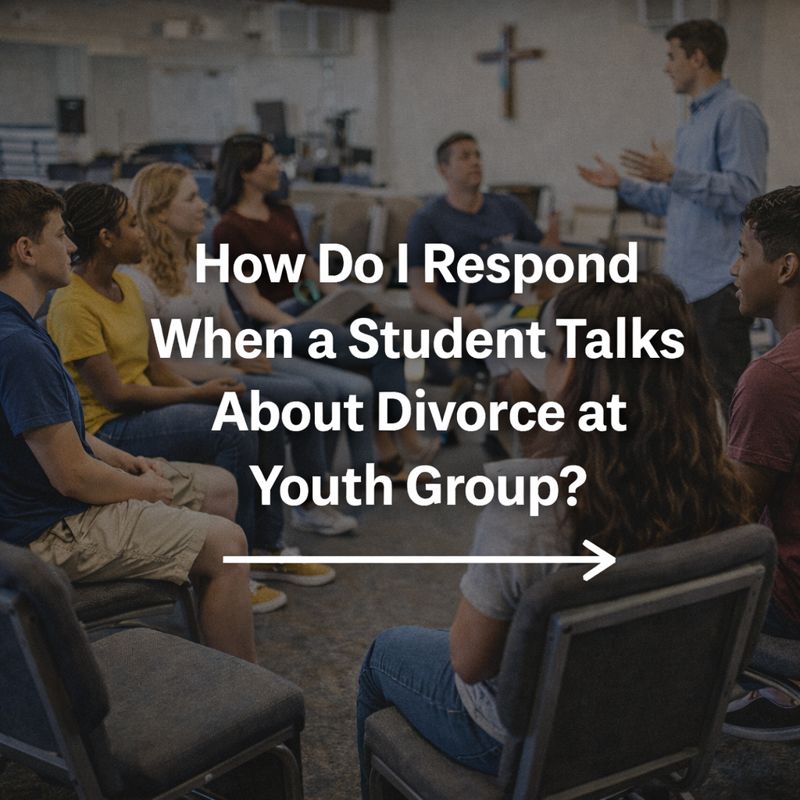
How Do I Respond When a Student Talks About Divorce at Youth Group?
If you’ve been in youth ministry longer than a few years, you’ve had a student bring up divorce at youth

If you’ve been in youth ministry for more than five minutes, you’ve likely bumped into a version of this debate: “Shouldn’t youth group be fun? Students won’t come back if they’re bored,” versus, “We’re here to make disciples, not just play games.” And the truth is, both sides have a point. Some ministries lean so heavily into fun that the gospel gets reduced to a punchline between dodgeball games. Others go so deep into teaching that youth group feels more like seminary—rich in theology, but dry and disconnected from the lives of actual teenagers. But here’s the good news: fun and depth aren’t at odds. When used well, they fuel each other. So let’s break down how to strike a balance between fun and depth in youth ministry curriculum.
Let’s be honest: students aren’t likely to walk into a new space—especially a faith-based one—without some kind of draw. That’s where fun plays a crucial role. Games, energy, and laughter break down walls. They make it easier to walk in the door and harder to leave feeling like an outsider.
Fun isn’t just an optional extra in youth ministry—it’s a foundation for trust and connection. As Lifeway Students explains, “Give your leaders permission to use fun as a means of connection with students and the foundation for relationship building… fun is what holds their attention, fun is what builds connection” (Lifeway Students).
But fun is only the first step. Students might come for the experience, but they stay because something deeper connects. When students encounter Jesus in a way that actually speaks to their hearts and stories, they begin to see youth group as more than a weekly event—it becomes a place of transformation.
Research shows that today’s teens aren’t drawn to flashy programs as much as to genuine community and meaning. In fact, the Fuller Youth Institute notes that “young people aren’t asking for cool programs—they’re looking for warm community… teenagers want friendship and meaningful connection with both peers and adults” (Fuller Youth Institute).
The key is to be intentional. Don’t let fun take over your purpose. Let it serve your mission. Design your environment so students feel like they belong, and then take them somewhere meaningful once they’ve shown up.
Bottom Line: Fun opens the door. Depth is what makes them come back.
It’s easy to assume that depth means complexity. Longer messages, more theological terms, or an overwhelming number of verses can feel impressive—but that doesn’t always equal transformation. Students need more than just knowledge; they need truth that lands. Great teaching isn’t just about what you say—it’s about how students experience it. The best lessons hold theological weight and connect to real life. They don’t compromise truth, but they do contextualize it.
Use everyday stories, relatable struggles, and practical questions to help students see that Scripture isn’t some distant, ancient text—it’s alive, and it speaks into the things they care about right now.
Bottom Line: Don’t aim for more content—aim for better connection.
The large group might spark something. But small groups are where it settles in. Some students listen better in a crowd. Others won’t say a word unless they’re sitting in a circle with trusted people. That’s why small groups matter so much—they give students the space to ask hard questions, reflect honestly, and apply truth in a personal way.
Start small groups with something light. Humor and easy conversation create a safe environment. Then go deeper. Lead discussions that matter. Don’t just recap the message—wrestle with it. Ask students what’s confusing, what’s hard, and what next step they need to take.
Bottom Line: Small groups help truth move from the page to a student’s actual life.
The best youth ministries don’t pit fun against depth—they hold them together. A national survey from Springtide Research found that young people want environments where “fun, meaningful relationships and spiritual growth are combined with intention” (Springtide Research Institute). Similarly, Fuller Youth Institute affirms that “cultivating trust is every bit as important in the faith formation of young people as teaching for transformation. Both are integral” (Fuller Youth Institute).
We’ve all seen ministries that have the hype dialed all the way up—but when you look closer, the spiritual roots are shallow. Students are busy and enthusiastic but spiritually stagnant. We’ve also seen the opposite—ministries where students hear solid biblical teaching but feel disconnected, uninspired, or unsure of how it applies to their world. The content is strong, but the connection is weak.
The best youth ministries don’t pick between the two. They let the gospel be compelling and create a space where students feel like they can laugh, belong, ask hard questions, and grow. Jesus Himself was a master of this balance. He told stories. He asked questions. He met people where they were. But He never watered down the truth. He called people to real discipleship—and they followed.
Bottom line: Fun and depth in youth ministry curriculum aren’t competing goals. They’re complementary tools.
Students don’t need more entertainment. And they don’t need another dry lecture. They need a space where the gospel comes alive—where truth is clear, hope is real, and their presence actually matters.
When you get the balance right, students won’t just show up—they’ll grow. And they won’t just grow for a semester—they’ll carry what they’ve learned into the rest of their lives.
Related Posts:
How to Make Sermons More Engaging for Gen Alpha
Why Theological Depth Matters in Youth Ministry Curriculum
C
t G Shades Curriculum – A gospel-centered approach that balances depth with engagement.

If you’ve been in youth ministry longer than a few years, you’ve had a student bring up divorce at youth

Every single youth leader has felt this tension before: students on their phones during youth group. You work hard to

It’s that time again. It’s December, which means we have to plan for the year. I don’t know about you,